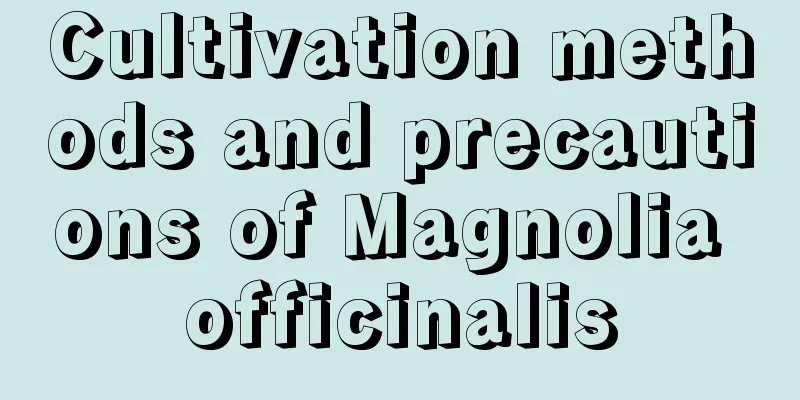Cultivation methods and precautions of Magnolia officinalis

1. Maintenance methods1. Temperature: Magnolia officinalis is a plant that likes cool weather. Generally speaking, in areas where it is suitable for distribution, the average annual temperature is generally between fourteen and twenty degrees. During the coldest time, the average temperature should reach between three and nine degrees so that it can survive the winter safely. 2. Light: Magnolia officinalis is light-loving. During its growth period, it has high requirements for sunlight, otherwise its growth will be very slow and it is easy to grow too tall. Therefore, during this period, do not be too shaded. When encountering very strong light, you can provide some shade, but do not block out the light completely. 3. Watering: Magnolia officinalis likes moisture and has very high requirements for air humidity. And because its root system is relatively developed, it has good waterlogging resistance. During the growth period, water needs to be replenished in time to ensure moisture. But in winter, especially when the temperature is very low, you have to control the water. 4. Fertilization: It has a certain demand for fertilizer, but not too much. In addition to the fixed base fertilizer, the number of topdressing applications can be controlled to twice a year, and there is no need to do it too much. 2. Breeding techniques1. Reproduction: It can be propagated by sowing. From September to October, you can prepare to collect fruits and obtain seeds. After harvesting, store it in moist sand. In the spring of the second year, it can be taken out and sown. Because there is a waxy layer on its surface that prevents it from germinating, it needs to be removed before sowing. The "row sowing" method can be adopted, the row spacing can be about 30 cm, and the distance between each seed can be between 3 and 6 cm. 2. Weeding: This step is more important because there will be many weeds every once in a while. Generally speaking, weeding should be done at least twice a year. After weeding, top dressing can be carried out. 3. Problem diagnosis and treatment1. Disease: The main type is "leaf blight", which can be controlled by Bordeaux. There will also be "damping-off disease". In addition to spraying pesticides, the substrate must also be disinfected, for example, with lime. 2. Pests: Mainly "brown longhorn beetles", the adult of which is more harmful, so the main task is to catch and kill its adults. IV. Other issues1. Toxicity: It is not poisonous. Moreover, it is a good medicinal material. 2. Can it be raised at home? Generally not. Firstly, it is relatively large in size and is not suitable for home. Also, it is also a protected plant. |
<<: The cultivation methods and precautions of Red Prince Weigela
>>: Cultivation methods and precautions of flower peony
Recommend
When does the purple flower bloom?
Flowering period of purple lily The flowering per...
8 super cold-resistant plants that are not afraid of frostbite
Cymbidium The most cold-resistant of domestic orc...
How to reproduce Victoria
Reproduction method Division method The best time...
How long does it take for flax seeds to grow?
Introduction to Flaxseed Growth Flax seeds prefer...
How to grow chrysanthemum
Growth habits of chrysanthemum The medal chrysant...
How to restore the leggy growth of Lithops
1. What are the harms of leggy growth? When growi...
The legend and language of the evening mist flower
The Legend of Evening Mist Flower Yugiri is one o...
How to grow jade tree flowers so that they bloom
Jade tree blossoms Jade plant usually blooms in s...
How to divide Clivia
Preparation flowerpot For home potted plants, you...
When is the best time to repot orchids?
Orchid repotting time If the orchid is not repott...
Time and method of cuttings of juniper
Time for cuttings of juniper Juniper is suitable ...
Can loquat seeds be planted?
Can loquat seeds be planted? Loquat seeds can be ...
Can I grow orchids on the gravel on the construction site?
Can orchids be grown on the gravel on the constru...
How to grow oleander in spring
1. Control the temperature Oleander will stop gro...
How to propagate Pilea coleus by cuttings
Cutting medium When it comes to cuttings, the cut...









